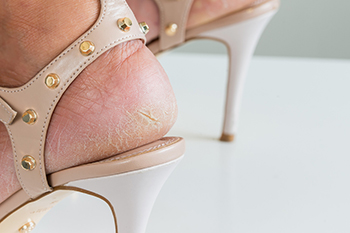
Cracks in the heels occur due to damage to the skin's protective outer layer. This layer normally retains moisture in the skin through natural oils. However, when this barrier is compromised by things like ill-fitting shoes, harsh weather, or an inadequate diet, moisture escapes. Consequently, the skin becomes dry, brittle, and rigid. Over time, the pressure of one’s body weight causes the skin to split and bleed, resulting in varying sizes and depths of cracks. The discomfort associated with cracked heels stems from the exposure of sensitive lower skin layers, easily irritated by the environment, and prone to snagging on socks or clothing. While cracked heels are primarily a cosmetic concern, in severe cases, deep cracks that bleed can raise the risk of infection. This is particularly concerning for individuals with underlying medical conditions like diabetes, where severe skin damage or infection is a higher risk. To alleviate the pain of cracked heels, rehydration to restore the skin's protective barrier is key. Applying moisturizer daily and cushioning the feet with comfortable shoes and padded insoles can aid in the healing process. If you suffer from persistent or worsening cracked heels, it is suggested that you make an appointment with a podiatrist for treatment.
Cracked heels are unsightly and can cause further damage to your shoes and feet. If you have any concerns, contact Dr. Richard Silverstein from Union Foot Care. Our doctor can provide the care you need to keep you pain-free and on your feet.
Cracked Heels
Cracked heels appear unappealing and can make it harder for you walk around in sandals. Aside from looking unpleasant, cracked heels can also tear stockings, socks, and wear out your shoes. There are several methods to help restore a cracked heel and prevent further damage.
How Do You Get Them?
Dry skin is the number one culprit in creating cracked heels. Many athletes, walkers, joggers, and even swimmers suffer from cracked heels. Age and skin oil production play a role to getting cracked heels as well.
Promote Healing
Over the counter medicines can help, especially for those that need instant relief or who suffer from chronic dry feet.
Wear Socks – Wearing socks with medicated creams helps lock in moisture.
Moisturizers – Applying both day and night will help alleviate dryness which causes cracking.
Pumice Stones – These exfoliate and remove dead skin, which allows for smoother moisturizer application and better absorption into the skin.
Change in Diet
Eating healthy with a well-balanced diet will give the skin a fresh and radiant look. Your body responds to the kinds of food you ingest. Omega-3 fatty acids and zinc supplements can also revitalize skin tissue.
Most importantly, seek professional help if unsure how to proceed in treating cracked heels. A podiatrist will help you with any questions or information needed.
If you have any questions, please feel free to contact our office located in Havre de Grace, MD . We offer the newest diagnostic and treatment technologies for all your foot care needs.
